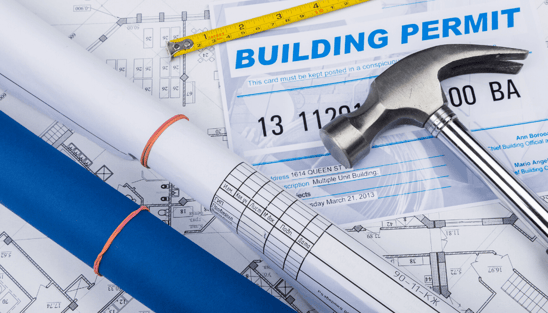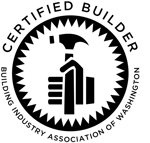Who, What, Where, When & How Much: Ask these 12 Questions before hiring a remodeling contractor.
A home remodel can be as exciting and nerve-racking as embarking on a trip to an unknown land; but you don’t have to go into it blindly. Ask these 12 questions to several contractors you’re considering for the job, and then hire the contractor who can provide the answers you want to hear. For your convenience, we’ve included our answers below.
Question #1 to ask a remodeler: Am I Located in Your Service Area?
Answer You WANT to Hear: Yes! You are in our service area!
Why You Want to Hear It: There is only so much time in a day and if a contractor commits to too many jobs spread throughout a large region, you will end up with the short end of the stick while he spends most of his day driving from job to job and less time on your project.
VanderBeken Remodel’s Answer: Our service area for remodeling Washington currently includes:
- Edmonds, WA
- Everett, WA
- Marysville, WA
- Mill Creek, WA
- Mukilteo, WA
- Snohomish, WA
Question #2 to ask a remodeler: Do you Specialize in My Remodel Project?
Answer You WANT to Hear: Yes, IF your project is X, Y, or Z.
Why You Want to Hear It: Webster’s Dictionary defines “specialize” as “to concentrate one’s efforts in a special activity, field, or practice.” When you are looking for a remodeling contractor, you don’t want one who does in Projects A, B, C, D, E…; that would be the definition of a “Jack of All Trades.” Rather, you want a seasoned professional remodeler with a wide knowledge base but a focused area of specialty. You want someone who does your type of project every day, because they will be extremely knowledgeable about every little detail about your project.
VanderBeken Remodel’s Answer: We specialize in remodeling bathrooms, kitchens and whole homes. Our team strives to provide an exceptional client experience while we increase the aesthetics, function, and value of your home.
Question #3 to ask a remodeler: How Long Have You Been in the Industry?
Answer You WANT to Hear: 10+ years
 Why You Want to Hear It: With time and experience comes wisdom, and you want to work with a remodeler who has the wisdom to know how to serve you best. One way to determine whether a remodeler has been around long enough to have good experience is to ask if they 10+ client referrals who you could speak with first before hiring them for your project.
Why You Want to Hear It: With time and experience comes wisdom, and you want to work with a remodeler who has the wisdom to know how to serve you best. One way to determine whether a remodeler has been around long enough to have good experience is to ask if they 10+ client referrals who you could speak with first before hiring them for your project.
VanderBeken Remodel’s Answer: VanderBeken Remodel has been business since 2007. We are a family-owned design-build remodeling company based in Snohomish County with 40+ years of experience working on award winning kitchen, bath and home additions in Washington.
Question #4 to ask a remodeler: Are You Licensed, Bonded & Insured?
Answer You WANT to Hear: Yes (and it’s current).
 Why You Want to Hear It: To protect yourself and your home. Every state is different when it comes to whether or not they require contractors to carry a license. In Washington State however, all construction contractors are required to register with the WA State Department of Labor & Industries. Look up any contractor, tradesperson or business on L&I’s website here to confirm they have a current license. If a contractor is not licensed, they can be charged with substantial penalties and fines. Additionally, if damages occur during the remodeling project and the company or individual doesn’t have a license or is insured the cost of the repairs falls to the homeowner. There isn’t any recourse for work unfinished or done poorly either. Worse yet, if the unlicensed contractor falls off your roof or has an accident in your home you can be held responsible for any medical bills.
Why You Want to Hear It: To protect yourself and your home. Every state is different when it comes to whether or not they require contractors to carry a license. In Washington State however, all construction contractors are required to register with the WA State Department of Labor & Industries. Look up any contractor, tradesperson or business on L&I’s website here to confirm they have a current license. If a contractor is not licensed, they can be charged with substantial penalties and fines. Additionally, if damages occur during the remodeling project and the company or individual doesn’t have a license or is insured the cost of the repairs falls to the homeowner. There isn’t any recourse for work unfinished or done poorly either. Worse yet, if the unlicensed contractor falls off your roof or has an accident in your home you can be held responsible for any medical bills.
VanderBeken Remodel’s Answer: Yes, we are licensed, bonded and insured. Our Liability Insurance is through CBIC. We hold $2,000,000 in general aggregate and $1,000,000 in personal injury among required areas of insurance. We also have a Bond through Wesco Insurance Co. Our Washington State license number is VANDER*811RD. Client satisfaction is extremely important to us and we are proud to say that we have never had a claim against our bond or insurance policy.
Question #5 to ask a remodeler: What is the projected timeline for this project?
Answer You WANT to Hear: A specific time range.
Why You Want to Hear It: While unexpected problems might arise as walls are removed or structures are built, an experienced contractor should be able to give you a projected time for completion of the project.
VanderBeken Remodel’s Answer: Once the Scope of Work has been hammered out with the details of the project and the fixed investment price agreed upon a start and finish date are established. This is important because a remodel of any size is an emotional experience for a homeowner and to know how long the process will take tends to ease the disruptions to normal family life. Keep in mind, client requested change orders do add time to the schedule and will delay the finish date.
Question #6 to ask a remodeler: My Budget Range for this Project is in a Range of $X to $Y. Is this Realistic?
Answer you WANT to Hear: Yes, your range is a fair one but keep in mind that finishes, such as the price point of tile or hard surfaces, can impact the bottom line of the project tremendously. We can help you design a project that would be economically comfortable for your family.
Why You Want to Hear it: Of course, the cost of remodeling will be one of your first concerns and it is always best to have realistic expectations. Something you may want to ask yourself is how much HGTV have you been watching and are the costs (not to mention timelines) that you see on various programs going to help set realistic expectations or hinder. While doing research for your project you may have friends, co-workers, or family that have recently had a remodel completed by a reputable and professional remodeling firm. Asking them about their overall experience and the cost of the project is a great way to get a feel for what you can expect. However, if you are uncomfortable with asking them how much they spent (after all that could get awkward) then be sure to check out Remodeling magazine’s annual Cost vs Value Chart. The CvsV Chart has a number of projects outlined with both the general cost of the project and the return value organized by regions across the United States. So, for an informative third party resource go to www.remodeling.hw.net.
VanderBeken Remodel’s Answer: Every remodel is unique, because every client is unique and therefore their design and finish selections will be unique. Download our free Snohomish County Home Remodeling Cost Guide to explore the costs and considerations of remodeling your home. Rest assured, as a design-build remodeling company VanderBeken Remodel will walk with you step-by-step throughout the whole remodel answering your questions and providing expert design and construction advice to ensure you receive the remodel of your dreams (and your budget).
Question #7 to ask a remodeler: How often will you stop by to check on the progress?
Answer You WANT to Hear: Daily.
Why You Want to Hear It: The remodeling company you hire should have a named project manager assigned specifically to your job who should be on site each day to oversee progress and ensure the work is being done according to the plan you agreed to in the beginning of the project.
VanderBeken Remodel’s Answer: Your assigned Project Manager, will either be on-site daily or communicating with you via BuilderTrend as to what to expect for each phase of your project as well as informing you of which Specialty Contractor(s) will be on-site that day. In addition, your Project Manager will schedule a weekly meeting with you to ensure your satisfaction throughout the project.
Question #8 to ask a remodeler: Do you provide a written Fixed Price Contract and a detailed Scope of Work for every project?
Answer You WANT to Hear: Yes.

Why You Want to Hear It: While some remodelers work with a time and materials process, the best model is the fixed investment price model. This requires detailed planning on the part of the remodeler at the start of the project, but it provides the smoothest project process overall as there are no surprises or hidden fees.
VanderBeken Remodel’s Answer: Following our Design/Proposal Process we provide a written proposal that includes not only the details of the project but a line by line Scope with a Fixed Investment Price for the entire project. We would be happy to help you understand the difference between a fixed price contract and a time and material or cost-plus contract. It really boils down to who is willing to shoulder the risk.
Question #9 to ask a remodeler: Who pulls required permits for the job, you or me?
Answer You WANT to Hear: The Contractor.
Why You Want to Hear It: They are the professionals that know what needs to be done. This also gives the inspecting authority the name of your contractor.
VanderBeken Remodel’s Answer: We will pull all the necessary permits and schedule the inspections so that you can rest assured that your project is following safety codes and regulations.
Question #10 to ask a remodeler: Will you offer a guarantee on your work, and, if so, what is the guarantee?
Answer You WANT to Hear: Yes, with a specific amount of time (six months, one year, lifetime, etc.).

Why You Want to Hear It: You wouldn’t purchase a car without some type of warranty against defects; you shouldn’t hire a
contractor who can’t guarantee work, either. Contractors can guarantee against two types of problems: (1) Defective Materials, and
(2) Workmanship Problems. A written guarantee should include clauses that state what the contractor will cover and for how long.
VanderBeken Remodel’s Answer: Our contract states that all work is warranted as to workmanship, in accordance to standard practices for remodeling. All material used is warranted to function to the limits of its designed use and will be of new quality. The warranty period listed in our contract is two years, however, we have yet to have a claim submitted. Keep in mind that we perform a walk through both at 90 days following completion and 12 months following completion. We want to be sure that you are happy with your new space.
Question #11 to ask a remodeler: What is the payment schedule?
Answer You WANT to Hear: Depends on the company, but you should never pay the entire amount up front and you should be wary of someone asking for more than 30%.
Why You Want to Hear It: Different contractors may offer different options when it comes to payment and different options may work better for your situation. However, never pay for the work in its entirety prior to the job’s completion and inspection.
VanderBeken Remodel’s Answer: Once the production contract is signed (following the design agreement and process) we request between 20% and 30% of the total project price. This makes it possible for us to order cabinets, tile, flooring, and secure the specialty trade partners that will be working on your project. Then we set up a payment schedule for a portion to be paid every two weeks for the duration of the project.
Question #12 to ask a remodeler: Do you belong to any professional organizations and, if so, which ones?
Answer You WANT to Hear: Yes
Why You Want to Hear It: Why You Want to Hear It: Joining an association for contractors is not a necessity, but it does show the commitment a potential contractor has to the job and the industry in general. Professional associations, which may be national, statewide, or even specific to the contractor’s specialty, offer added training, networking and research materials to members in an effort to keep them up to date with practices.
VanderBeken Remodel’s Answer: We are members of the Master Builders Association of King & Snohomish County and served for multiple years on the leadership team (including as the vice-chair of the Council, the yearly Rampathon event, and chairing the annual Remodeled Homes Tour). We are also certified with additional accreditations with the BIAW, NAHB and Chief Architect.




**BONUS TIPS** The Better Business Bureau and the Federal Trade Commission recommends the following tips for spotting a disreputable contractor:
- solicits business by going door to door
- prefers that you pay in cash
- uses high-pressure sales tactics to convince you to make a quick decision
- requests that you pay for the entire job upfront
- has the “perfect” lender for you (which often leads to home improvement loan scams)
Looking for some more great resources on your remodeling journey? Be sure to download our free "Six Quick Questions to Ask Any Remodeler" resource that will help guide you through some great questions to ask remodelers in order to find the best fit for you and your project (we have already included our answers in the document).


